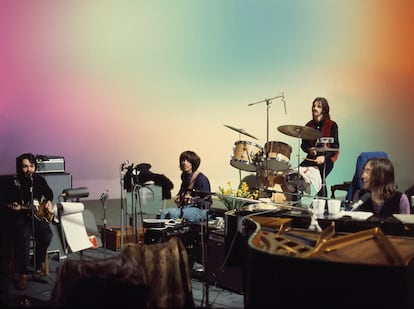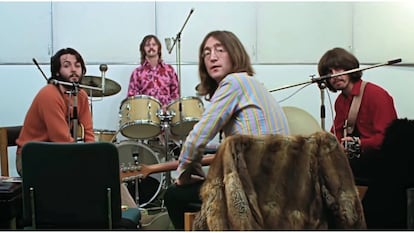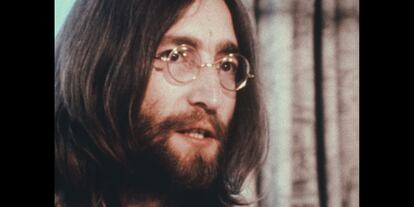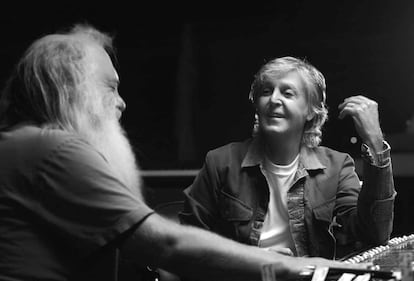Lennon owned the 20th century, but McCartney rules the 21st
The newest Beatles documentaries on different platforms showcase Paul’s talent and leadership in the last years of the band

The myths of martyrs are incredibly enduring. However, the ones who are not martyred have the opportunity to rival such legends. After all, time is on their side. Paul McCartney has certainly succeeded at this, as we can see in three exceptional documentaries on The Beatles available on various streaming platforms. More than 50 years after their breakup, the band can still captivate and inspire people worldwide.
“We’re more popular than Jesus Christ,” John Lennon said one day in a fit of pique during a March 1966 interview. After facing cancellations of TV appearances and criticism from conservative media, Lennon still refused to apologize for the statement. His words may not have been an exaggeration, given the group’s significant impact on popular culture over the decades. In fact, one could argue that Lennon even underestimated the group’s enduring influence.
The Beatles’ post-breakup career has extended into the 21st century, generating fervent discussion on social media about documentaries like The Beatles: Get Back (Disney+), McCartney, 3, 2, 1 (Hulu), and John Lennon: Murder Without a Trial (Apple TV). If anything, these histories of the Beatles show that while John Lennon owned the 20th century, Paul McCartney rules the 21st.

Shortly after their acrimonious 1970 breakup, Lennon and McCartney seamed to be on equal footing. But Paul’s solo career, as well as his time with Wings, outshone John’s musical efforts with his wife, Yoko Ono. Tragedy struck when Lennon was murdered by Mark David Chapman on the sidewalk in front of his New York City home. Chapman, who claimed to be inspired by J. D. Salinger’s The Catcher in the Rye, shocked the world with his senseless act. Lennon became a martyr of sorts, which elevated him to mythical status.
John Lennon: Murder Without a Trial is noteworthy because it includes some of the first direct witness testimonies we’ve ever seen. In one scene, Chapman’s girlfriend poses a deliberate question: “Do you realize what you’ve done?” It goes beyond condemning the act of taking a life. The victim was not just an earthly idol but a revered figure, elevated to divine status by popular global acclaim.
Lennon’s genius and charisma seemed strong enough to withstand everything. All the adulation didn’t seem to change his down-to-earth personality. Paul took a supporting role, standing by a friend and bandmate who inspired a philosophy of peace during the Cold War. But Lennon’s white-hot fame tragically overshadowed his convictions, leading to his untimely death.
In the 21st century, Paul McCartney has adeptly embraced the evolving public perception of the Beatles. Directed by Peter Jackson, The Beatles: Get Back documentary exemplifies this trend. The three-part Disney+ series (nearly eight hours) released in 2021 reveals many insights about the band’s final days. Jackson masterfully incorporates previously unseen footage from the rehearsal and recording sessions that ultimately produced the band’s final two albums: Abbey Road and Let it Be.
Closeness, intensity and truth emanate from the images in the documentary. Gestures, silent undercurrents, harmony and creative electricity all speak for themselves. Viewers experience the band’s final days not as voyeurs, but as part of the family. The film invites us to enter a profound time in contemporary pop culture.

Peter Jackson introduces us to a creative state of grace that laid the foundation for all the pop music to come. Nothing in the 50 years since measures up to the final years of the Beatles. From Sgt Peppers Lonely Hearts Club Band in 1967 to their last concert on a Savile Row rooftop in London, the band was on a magical, three-year journey of pure creativity.
The documentary reveals McCartney’s subtle yet forceful leadership in the final days of the band. His determination, guidance and musical composition set him apart from the other three. Unlike Lennon, who was committed but passive, McCartney wanted to stay while Lennon wanted to leave.
McCartney 3, 2, 1 (Hulu) is another must-watch Beatles documentary. Starring Paul McCartney and producer Rick Rubin (Red Hot Chili Peppers, Linkin Park, Shakira, Kanye West, Eminem, Lady Gaga, Lana Del Rey, Johnny Cash and Neil Diamond), the six-part series features the pair discussing McCartney’s career, from the Beatles and Wings to his time as a solo artist.
Shot in black and white, McCartney and Rubin sit at a mixing console and delve into the secrets and magic of his music. We see McCartney’s natural brilliance and the ease with which he composes some of the world’s most iconic pop songs. His prodigious mastery of melody is wonderfully reflected in unpretentious stories about how the music was made. The documentary is further evidence of the significant role that Paul McCartney played in the history of music.

The artistic influence of The Beatles transcended music, as showcased in the three documentaries. These films, especially the one exploring Lennon’s murder as a social phenomenon, underscore the transformative power of music. The documentaries by Peter Jackson and Rick Rubin further emphasize the potential of music as a catalyst for change.
With their unwavering dedication and innocence, the Beatles sparked a phenomenon that revolutionized minds and traditions through the power of art. They lived through a genuine cultural battleground, unlike the modern-day instances where regressive ideological conflicts are falsely labeled as such. The question remains: did the Beatles already win this battle with their music?
Sign up for our weekly newsletter to get more English-language news coverage from EL PAÍS USA Edition
Tu suscripción se está usando en otro dispositivo
¿Quieres añadir otro usuario a tu suscripción?
Si continúas leyendo en este dispositivo, no se podrá leer en el otro.
FlechaTu suscripción se está usando en otro dispositivo y solo puedes acceder a EL PAÍS desde un dispositivo a la vez.
Si quieres compartir tu cuenta, cambia tu suscripción a la modalidad Premium, así podrás añadir otro usuario. Cada uno accederá con su propia cuenta de email, lo que os permitirá personalizar vuestra experiencia en EL PAÍS.
¿Tienes una suscripción de empresa? Accede aquí para contratar más cuentas.
En el caso de no saber quién está usando tu cuenta, te recomendamos cambiar tu contraseña aquí.
Si decides continuar compartiendo tu cuenta, este mensaje se mostrará en tu dispositivo y en el de la otra persona que está usando tu cuenta de forma indefinida, afectando a tu experiencia de lectura. Puedes consultar aquí los términos y condiciones de la suscripción digital.









































